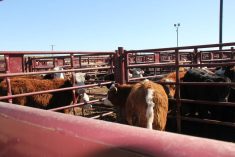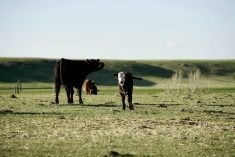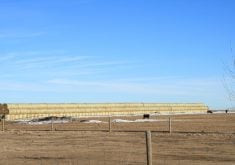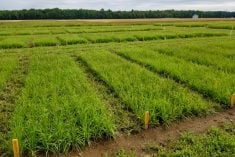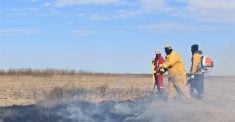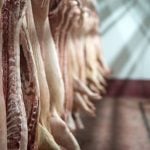Vancouver Island contains a variety of landscapes: beaches with shells and the corpses of moon jellyfish, the frigid water of the Pacific Ocean washing in and out. A rugged, snow-capped mountain range looms over the island. Redwood trees reach high into the sky, the forest floor sheltered and mossy. There are grasslands here, too, in the lee of the mountains.
Within the diverse landscape, beef producers find pockets of land to raise their livestock and make their living. This includes Grant Henry, owner and operator of Henry Farms, who lives near Cowichan Bay and has found his retirement fueled with the passion of starting a ranch on the island.
Henry was born and raised on a cattle operation in Shergrove, Man. The landscape and climate there was much different than what he experiences now on the island — flat prairie dotted with trees and close to one of the largest lakes in the country, Lake Manitoba. In Manitoba, the winters are long, snowy and cold, a drastic difference from the moderate temperatures of British Columbia.
Read Also
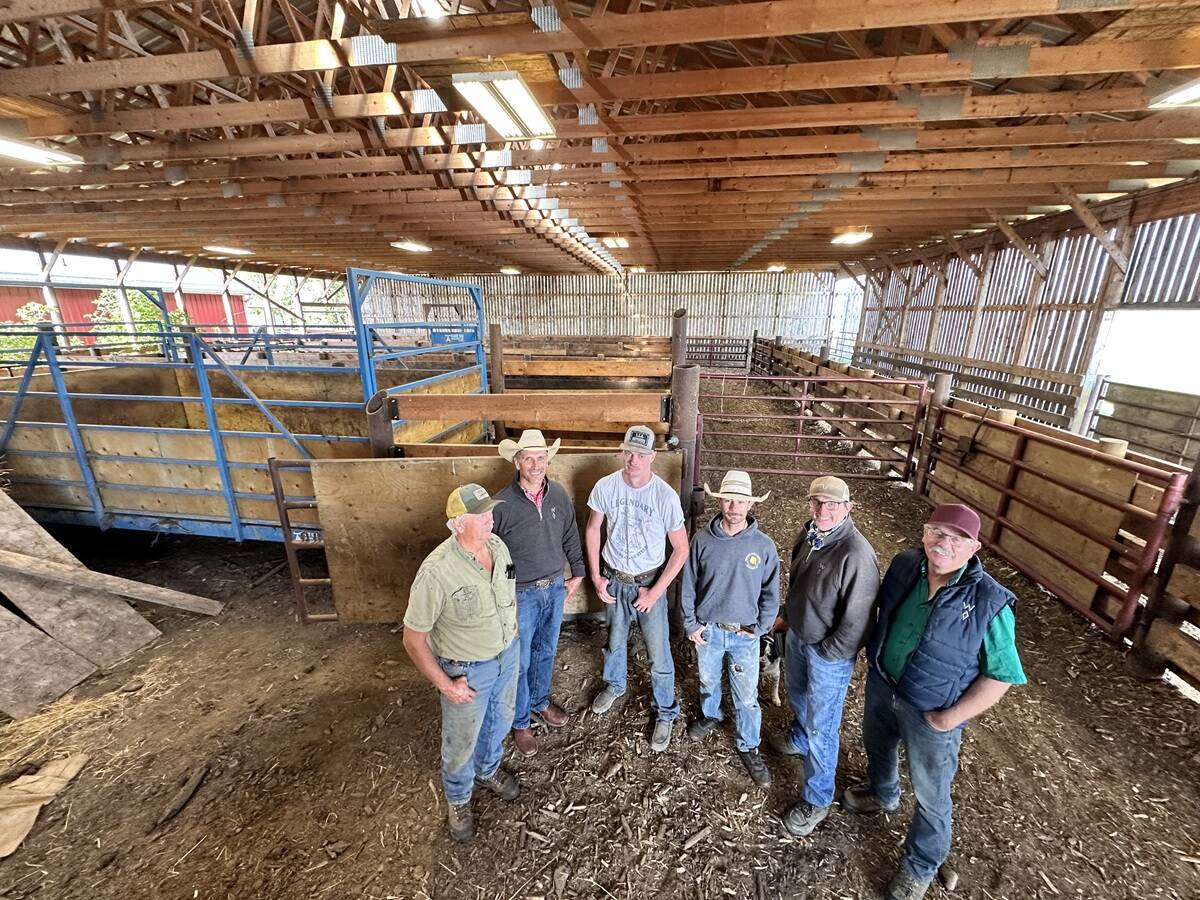
Farm families work together to graze cropland with cattle in the fall
These Alberta farm families have separate operations, but work together to manage their land
On the island, Henry has about 30 acres of land where he operates a small market garden, a small vineyard, and about 20 acres used for both hay and pasture. He started his operation in earnest after finishing his job as an agrologist with the provincial government and now is fully committed to it in his retirement.
Henry says they run about one head of cattle per acre during summer grazing and he winters his cattle at a partner’s place on hay and silage. His cattle are raised 100 per cent grass-fed — primarily because that’s what people in urban centres are interested in.
“We tell people they’re born with a lawnmower on front, not a combine,” Henry says.
Growing up on a Manitoba beef farm and now ranching on Vancouver Island, Henry can see all the benefits of raising cattle on the island — and all of the challenges.
Challenges
Brad Chappell has been ranching on Vancouver Island for many years and has seen and faced some of the primary challenges the island has to offer when it comes to raising livestock.
He says rural-urban interface zones are a big issue on Vancouver Island. It has a small land base, and the limited amount of land gets eaten up by the city.

A report done by the Comox Valley Regional District, where Chappell lives and ranches, says a growing issue in the region is urban areas creeping closer to existing farms. That means urban residents are exposed to odours and noise from the farm. Farmers may experience issues such as trespassing, littering, etc. The district suggests educating urban residents on farming practices as a solution, as well as mediation and zoning.
Chappell says 20 years ago, most of the revenue on the island came from industries such as forestry, agriculture, mining and fishing. That’s changed as cities have expanded.
Another issue is land. Given the limited land on Vancouver Island, ranches can’t be more than 200 to 300 head.
This also means the price of land is very expensive. Henry speculates it would be hard — almost impossible — to start a ranch on the island now without any type of help.
He says many ranchers on the island are getting older. The younger generation needs and wants to get involved, but that’s hard to do when land prices are so high.
“Young people work summer jobs for me and they want to get into the business but there’s no way they can afford to buy out their parents… it’s just tough.”
Henry says with land prices so high but ranches so small, it’s hard, or near impossible, to make a living off your ranch.
“You bank on appreciation and making some money, but I don’t know if that gives you enough cash flow in the business, depending on the amount of debt and how much money you generate.”
Chappell says another challenge is the cost of shipping cattle off the island.
He says with no auction mart on the island, cattle must be ferried to the mainland. But they wouldn’t sell for as much as producers would like given the cost. Other commodities, from hay to plastics, also face transportation costs coming and going from Vancouver Island.
This is why direct marketing has become more common on the island. Chappell runs a group known as “Island Pastures Beef,” which includes around 12 producers who direct market their beef together.
Henry direct markets his beef, as well.
“The older retired guys that have cattle on their property, they traditionally ship to the lower mainland to the auction marts, but there’s less of them operating and less cattle going,” Henry says. “It’s getting expensive to ship off the island. But I think people tend to look for direct marketing as a selling point.”
Positives
Despite all these challenges of ranching on the island, it offers plenty of benefits.
As someone who grew up in Manitoba and has experienced the drastic weather of the Prairies, Henry recognizes the ideal climate Vancouver Island offers. He says the mild weather on the island means they can graze longer.
“We can usually turn cattle back on pasture mid-April to the end of April,” Henry says. “So we’ve got a much longer grazing season. We can ship the last cattle off the pastures here sort of mid-November.”

For December, January and February, they winter graze, which Henry says is a lot easier due to the climate, as well. He says in the wet season they can’t just have cattle in pasture because it would punch up the ground too much, so all the winter grazing is confined.
“It certainly takes less winter feeding,” Henry says.
Chappell’s situation is a little different. His ranch is below Mount Washington. When they receive a snowfall, he says, it blows off the mountain, burying them.
“We get biblical snowfalls,” Chappell says.
For many producers like Henry and Chappell, public interest in direct-marketed beef is a positive, as well.
“It’s a premium product and we’re getting it and we’ve advertised it in that way,” says Chappell.
For Henry, the cattle side of his small operation is the most profitable, due in no small part to direct marketing.
He says one of the biggest considerations with direct marketing beef is keeping your price where you want it without chasing people away to cheaper places.
“How do you pass cost on to consumers and still compete in the real world? I mean, people will eventually go back to Walmart if you start charging too high for it. I try to price sort of between butcher shops and grocery stores.”
An enjoyable life
Despite all the challenges of ranching on Vancouver Island, Henry wouldn’t trade it for anything. He says sometimes he wishes he would have started ranching earlier, so he could do it longer.
Though Henry is in his sixties, he hopes to continue his operation for a little while longer — raising cattle, growing vegetables and operating his vineyard. Even after being raised on a cattle farm and having worked in the ag industry all his life, as a retirement gig, he says, having a small operation is enjoyable.
When speaking with Henry, it’s clear he doesn’t take himself overly seriously, happy to have a little fun with it.
“Oftentimes I’m giving bottles of wine on the sides of beef,” he says with a laugh. He also grows garlic, which customers also appreciate.
Henry also enjoys the direct marketing side of the business. He likes to sit in his booth at the market, connecting with his community and selling his products.
“It’s a lot of fun.”




